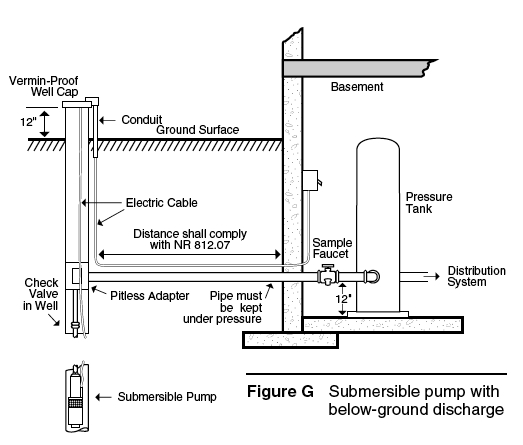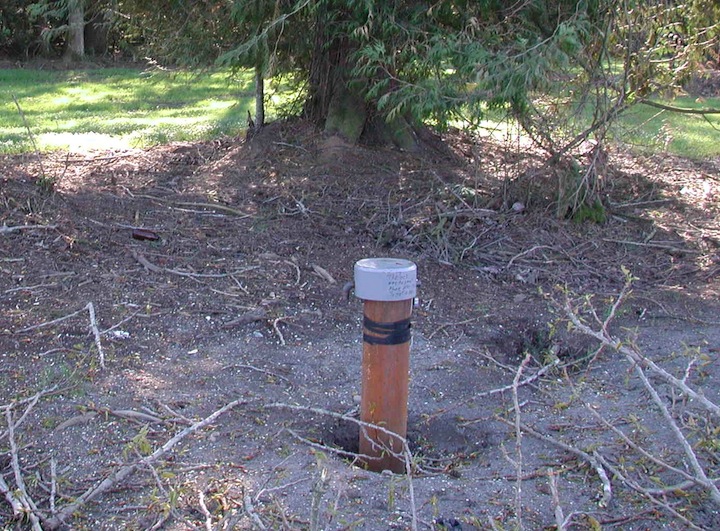Wells
There are many different kinds of private water supplies that homeowners use for potable water. We will limit our discussion to drilled wells, which are the most common. Also we will talk about well water quality in Homeowners/Well Water.
If you have a question about a different type of water supply, contact Frank. Get your Water Tested – Our Program!
BUYING OR SELLING REAL ESTATE HAVING A PRIVATE WATER SUPPLY
When you’re buying or selling property with a private well, there are some things that you should know and do. Of course, the buyer will think differently about it than the seller.
Seller’s Point of View
If your well is properly sited and constructed and the well and pressure tank are properly maintained, you have a good selling point which adds value to your property. If you don’t know anything about your well’s construction then what? You can do one of two things:
- You could have it inspected by a certified well driller and, if any problems are found, have them fixed. You can then show this inspection report to a potential buyer.
- You could completely ignore the subject and hope the buyer doesn’t know enough to bring it up. If the buyer is knowledgeable or has read this article, he/she is going to ask you some questions.
Buyer’s Point of View
You found the perfect house and you want to buy it. It has a well but so do all the other houses in the area. So you’re just like everyone else, right? Wrong! Stop to think about the well and try to get some information.
Let’s take this one point at a time.
- Where is the well located? They should be in the yard but some are in the basement, under a slab of concrete etc.
- The well should be at least 100 feet from any septic drain field on the property or on a neighbors’ property.
- Is it easily accessible for repair? (My well is 440 feet deep with 420 feet of plastic pipe that has to be pulled up to service the pump.)
- If the well is in the yard is the casing 12” to 18” above grade?
- Do you know the pump and tank info (horsepower, gallons per minute and tank size)?
- Has the water been tested?
- How old is it?
- How is it constructed?
- Is there a driller’s log?
- Did the well ever go dry?
- Did floodwater ever reach the well?
- When was the pump last replaced?
- What is the flow rate of the well?
- When was the pressure tank last serviced or replaced?
- Are there any unknown hazards around my property? Conduct an environmental database search of known hazards.
- If you are PA – Even more reason
The Carbon County Groundwater Guardians are very fortunate to have an expert on wells. Brian Oram and Greg Sorber are licensed well drillers. In addition, Keith, former active member, has written two articles:
1. “Well Construction”
2. “Picking a Well Water Contractor.”
It’s a good idea to call a certified well driller and have everything checked out. It doesn’t cost much and a few bucks for that may save many bucks in the future. The National Ground Water Association recommends the inspection should include:
- A flow test to determine system output, along with a check of the water level before and during pumping (if possible), pump motor performance (check amp load, grounding, and line voltage), pressure tank and pressure switch contact, and general water quality (odor, cloudiness, etc.).
- An inspection of well equipment to assure that it is sanitary and meets local code requirements.
- A test of your water for coliform bacteria and nitrates, and anything else of local concern. Other typical additional tests are those for iron, manganese, water hardness, sulfides, and other water constituents that cause problems with plumbing, staining, water appearance, and odor. Changes in these constituents also may indicate changes in your well or local ground water. Additional tests may be recommended if water appears cloudy or oily, if bacterial growth is visible on fixtures, or water treatment devices are not working as they should. Check with your water well contractor, state department of natural resources, or local health department for information on local water quality issues.
- A concise, clear, written report should be delivered to you following the checkup that explains results and recommendations, and includes all laboratory and other test results.
In Pennsylvania you are solely responsible for your well. You own a water company. If anything is wrong, or goes wrong, you have to fix it yourself. Inspecting the well does cost some money. You can make arrangements with the seller to cover this. You can also put contingencies in your offer to buy. Again, pay a little now or maybe a lot later.
Here is a picture of a well casing. What’s wrong with this picture?
The first thing you notice is the hole around the well casing. What caused it? The first thing I think of is that the pitless adapter that connects the tubing from the well pump to the tubing going into the house is leaking. It’s also possible that in times of heavy rain the well becomes artesian, with water flowing out of the top of the casing and onto the ground. The grass in the background appears higher than the well and any rain that falls will run toward the casing. This water will collect any bird or animal feces, fertilizer, pesticides etc, The hole will allow the water to collect and flow down into the well as it follows the wall of the casing. Well bores are eight to ten inches in diameter and the casing is six inches, which means there are two to four inches of annular space around the casing. (Grouting around the casing when the well is drilled helps prevent these problems.) Also, the casing does not have a sanitary well cap to keep small rodents, snakes and all sorts of critters out.
Looking at a well casing does not tell you anything about what is underground. Below is a schematic of a well with a submersible pump with below-ground discharge.

For information about well drilling contractors certified by the National Ground Water Association click HERE and click the link for Water well contractors.
In general, the housing industry and banking community requires only minimal testing as part of a real estate transaction. In most cases, this testing is completely inadequate and it is my professional opinion a more elaborate testing program should be conducted. This testing could be conducted by doing informational water testing for a wider range of parameters and then conducting specific testing as required my the lender or identified as potential problems during the informational water test.
Basic Loan – Normally only requesting total coliform (this is not adequate)
VA Loan – Total Coliform, Nitrate/Nitrite, Iron, Total Dissolved Solids, and Hardness (this is not adequate)
FHA Loan – Nitrate/Nitrite, Total Coliform, e. coli, Lead (this is not adequate)
If you are in the Region with Marcellus Shale Development, the baseline testing needs to include a larger suite of parameters for more information contact our Professional.
USEFUL LINKS ABOUT WELLS
Drilling A New Well
(PDF) Guide for Private Well Owners on the proper siting and construction of new private water wells published by Penn State University for its Master Well Owner program.
Pennsylvania Groundwater
(Link) A Brief Explanation on Groundwater Flow Systems and Groundwater Hydrogeology in Pennsylvania, including information on The Hydrologic Cycle, Occurrence of Groundwater, How Groundwater Moves, How Wells Work, Factors Affecting Groundwater Declines and Definitions of Terms.
Where Does My Drinking Water Come From
(Link) The Watershed Information Network web page, a service of the Environmental Protection Agency, is an excellent source of information on water quality in every state, the relationship of TV weather reporting and watersheds, and basic definitions of terms relating to drinking water. It also provides answers to many typical questions a water consumer might have.
Before You Drill A Well
(PDF) Albert R. Jarrett, Professor of Agricultural Engineering at Penn State which describes the steps which must be followed when drilling a new well and bringing it online. Topics covered include siting a well, developing the well, and testing of the pumping system.
Water Well Location By Fracture Trace Mapping
(PDF) Fractures underlying the earth’s surface are known by hydrologists to be the best locations to drill wells from which large volumes of water are needed, such as in industry. This is an excellent description of all that is involved.
Water System Planning – Estimating Water Use
(PDF) Details on how to estimate the total water usage from a water system as well as how to estimate the effective yield of drilled water well can be found in this Penn State School of Forest Resources publication.
Water Well Drilling And Abandonment (PA DCNR)
(PDF) Contains information on licensing requirements of well drillers in Pennsylvania and the proper procedures to be used in abandoning a previously used private well. (Website)
Private Water Wells In Pennsylvania (PA DEP)
(Link) Diagram of typical private water well in Pennsylvania, along with the naming of all the major installed components.
Private Drinking Water Wells (EPA)
(Link) Information to help you answer these three questions – Is our well water safe to drink? What health problems could my family face drinking water from our well? Where can I get answers?
Care and “Feeding” of your Well
(Link) Tips to maintaining a safe private water well, courtesy of the Know Your H20 Program
Best Management Practices For Private Water Systems
(PDF) Basic information all private well owners should be aware of.
Using Low Yielding Wells
Extensive information on the use and maintenance of low yielding private water wells can be found in the following Penn State publication.
Sanitary Well Caps And Grouting Wells
(PDF) What is a Sanitary Well Caps?
Protecting Wells With Sanitary Well Caps And Grouting
(PDF) Information concerning the need for sanitary well caps and grouting for private water wells.
National Groundwater Association – Groundwater And Well Drilling Information
(Link) This is the home page of the National Ground Water Association with extensive resources concerning groundwater and private wells.
How To Find A Water Well Contractor
(Link) Information on finding a reliable, certified well driller.
Pa Water Well Inventory – Online Database Of Well Logs For Private Wells In Pennsylvania
(Link) Provides information about PA well drillers and licensing, guidelines for well abandonment and links to web sites on private water wells. (How to Log a Well?)
Water Pressure
Have you ever had your shower reduced to a trickle because someone started the washing machine or turned on the dishwasher? This nuisance happens because your private water well system or utility pipeline doesn’t have enough water pressure.
Private Household Water Supplies
(PDF) Cornell University has provided this information on all aspects of private water wells.
Managing Your Well During a Drought
An excellent brochures from Penn State detailing well usage during a drought.
Hydrofracturing To Improve Pumping Efficiency
The process of Hydrofracturing is used to improve the pumping efficiency of low yielding water wells instead of drilling a new well.
New Booklet – Education Guide for Private Well Owners In Pennsylvania
If you have any questions, send an e-mail to Webmaster

